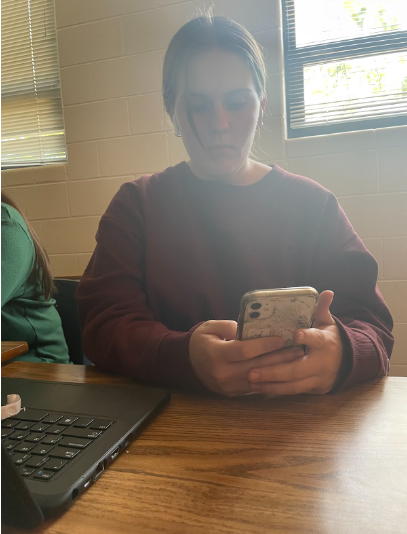No Cell Phones?

Student using their phone in class. The new phone policy implemented at the beginning of the school year has had a huge impact on students and teachers.
The new phone policy was created in an attempt to help students, but how do students really feel about it? Is it really helping them as much as FCPS thinks?
This year, FCPS created a new phone policy for all schools in Fairfax county. The phone policy is essentially no phones in class after the bell rings and one of the only places they are allowed is during passing time. There are many pros and cons to cell phones and technology as well as how it affects productivity levels and concentration. For example, according to indiatoday.in, some negative effects that cell phones have on students include lack of concentration, stress, lower grades, and cyber bullying. However, some positives include access to quick academic help, communication, enhanced organizational skills, advanced technology skills, and giving assistance in projects.
FCPS created this policy in order to eliminate distractions in the classroom created by cell phones and by doing this, they hope it will help students stay focused during class. This was made as an attempt to “help” the students. Is this policy helping them or has FCPS gone too far with rules and harsh punishments regarding cell phones?
Senior Brooke Womack said, “when you implement a new policy, you also have to understand the implications of emergency situations. Cell phones have become students’ first line of defense when it comes to emergencies. With the incline of school shootings, having a phone to instantly call first responders, or parents is a must.” This is significant because it’s especially applicable in today’s world. Phones are a student’s property and in a way provide them a sense of power over their safety at school. Womack says, “it hasn’t, I don’t often use my phone in class unless there is a non-instructional period.” So this phone policy has not positively helped Womack at all as a student/at school. Womack also expresses the dislike of not being able to contact her parents when she needs to.
Similarly, senior Amani Mitku shares her frustrations about the phone policy. “I think that the phone policy is very unnecessary in general because I don’t think it should be that much of a big deal.” Mitku feels that the rules regarding phones are very strict. She says, “I don’t like the fact that if you get three times throughout the year your parents have to pick it up. I don’t think that it should be that much of an issue.” Additionally, she said, “the policy should be more lenient and not so strict… I think that every teacher should choose whether their students can use phones or not (some do).” Yet Mitku pointed out a positive aspect of the phone policy by saying that, “the new phone policy helped me pay more attention in class, and [has helped me] get my work done faster.”
Lastly, senior Lauren Chung explains her general opinion of the phone policy saying, “I think it can help effectively by managing everyone’s screen time, letting them be more focused on work. Do I like it? Not preferably, but I’ll live with it.” She also shares an alternative to the phone policy by saying, “I believe it should ultimately be up to the teachers, but for the kids who abuse it, let them face the consequences.” This could be a possible alteration to the phone policy.
Overall, there are many pros and cons to phones and their effects on students at school. For some students, this might be a great tool to use in order to avoid distraction. However, for other students, this phone policy may be really frustrating and unhelpful.


